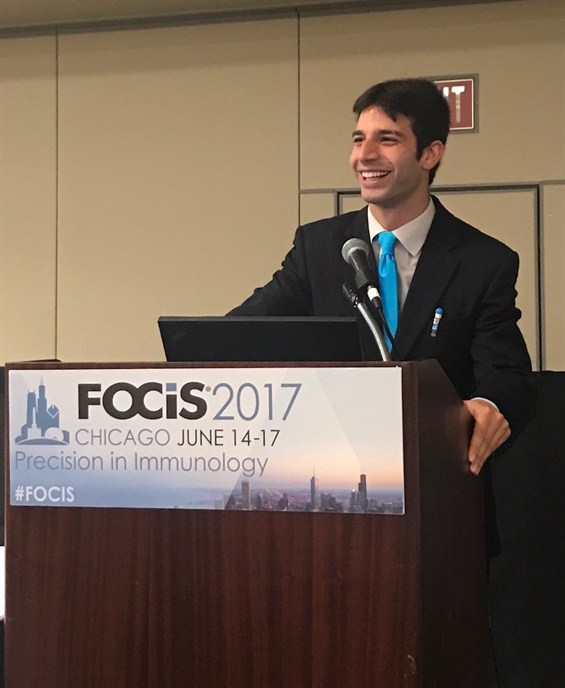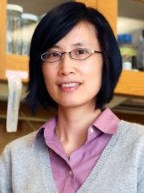Leonardo Ferreira Receives Best Poster Award from Federation of Clinical Immunology Societies
 Leonardo M.R. Ferreira, Ph.D., a postdoctoral scholar and molecular immunologist in the Tang Lab and Bluestone Lab at UCSF, received the "Best Poster Award" from the Federation of Clinical Immunology Societies (FOCIS) at the organization's 2017 annual meeting in Chicago.
Leonardo M.R. Ferreira, Ph.D., a postdoctoral scholar and molecular immunologist in the Tang Lab and Bluestone Lab at UCSF, received the "Best Poster Award" from the Federation of Clinical Immunology Societies (FOCIS) at the organization's 2017 annual meeting in Chicago.
The Federation of Clinical Immunology Societies (FOCIS) exists to improve human health through immunology by fostering interdisciplinary approaches to both understand and treat immune-based diseases.
Dr. Ferreira also received a travel award from the FOCIS Center of Excellence and was selected to present his work at the program session, “The Forefront of Immune Regulation”.
 His presentation, “Designing the Next Generation of Chimeric Antigen Receptors for Regulatory T Cell Therapy”, reported on early results of a new approach to engineering custom-made antigen-specific regulatory T cells, aimed at establishing immune tolerance in the contexts of autoimmune disease and transplant rejection.
His presentation, “Designing the Next Generation of Chimeric Antigen Receptors for Regulatory T Cell Therapy”, reported on early results of a new approach to engineering custom-made antigen-specific regulatory T cells, aimed at establishing immune tolerance in the contexts of autoimmune disease and transplant rejection.
Dr. Ferreira's collaborators in this work included Jeffrey Bluestone, Ph.D., A.W. and Mary Margaret Clausen Distinguished Professor of Metabolism and Endocrinology and Director of the Hormone Research Institute in the Diabetes Center, and Qizhi Tang, Ph.D., Professor and Director of the Transplantation Research Laboratory and Tang Lab in the UCSF Department of Surgery.
Abstract
|
Designing the Next Generation of Chimeric Antigen Receptors for Regulatory T Cell Therapy Manipulating human regulatory T cells (Tregs) offers the opportunity to induce tolerance in a clinical setting. However, low numbers of antigen-specific Tregs and Treg instability upon prolonged expansion have hampered the implementation of Treg-based therapies. Chimeric antigen receptor (CAR) technology has greatly expedited the generation of tumor antigen- specific effector T (Teff) cells. CARs are synthetic receptors comprising an extracellular antigen-binding domain and an intracellular signaling domain. The latter is commonly a fusion of CD28 and CD3z, allowing for potent T cell activation directly downstream of antigen recognition. Adoption of the CAR platform for Treg engineering represents a promising strategy to generate custom-made antigen-specific Tregs for therapy. Yet, there are marked differences in function and signaling between Tregs and Teff cells. Here, we interrogated CAR-mediated signaling in human Tregs and Teff cells by systematically modifying the CAR cytoplasmic domain. We constructed CARs with three different CD28 mutants, abrogating binding to PI3K, ITK, and LCK. Interestingly, disrupting CAR-mediated PI3K signaling did not significantly alter activation or proliferation of either Treg or Teff cells. However, preliminary data show that loss of PI3K signaling impairs CAR-Treg suppressive capacity. In addition, CARs with three different CD3 chains downstream of CD28, namely CD3z, CD3d and CD3e were examined. Replacing CD3z with other subunits invariably decreased CAR-mediated activation. Altogether, our results demonstrate that PI3K signaling is crucial for CAR-Treg function and that CD3z is essential for optimal CAR-Treg signaling, suggesting that novel CAR signaling modules may maximize CAR-Treg therapies. This work was supported by Juno Therapeutics, Inc. |

